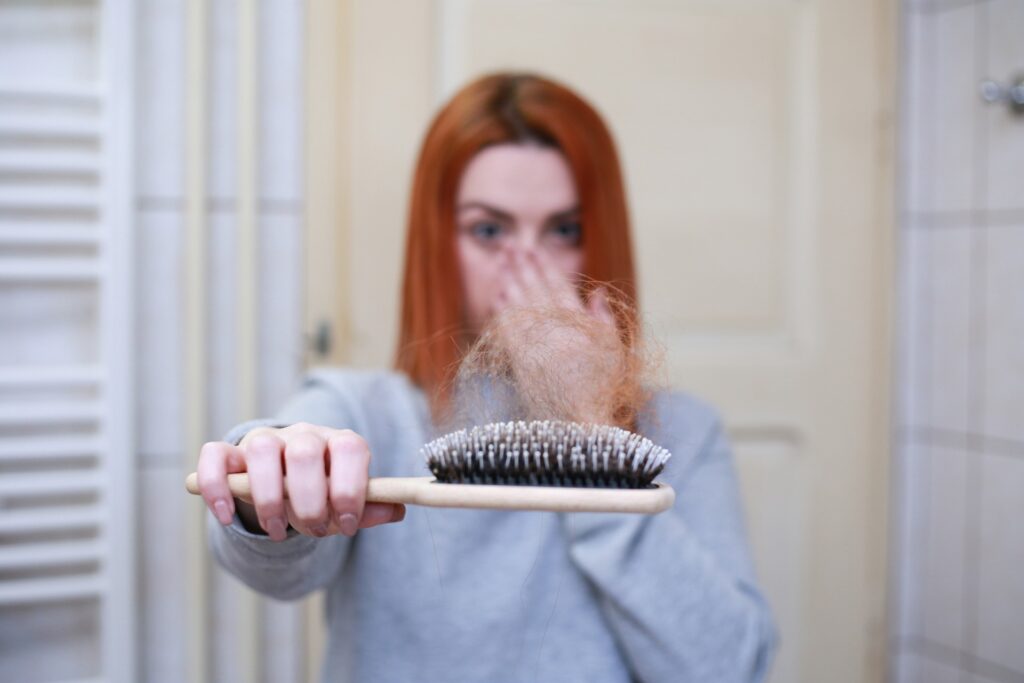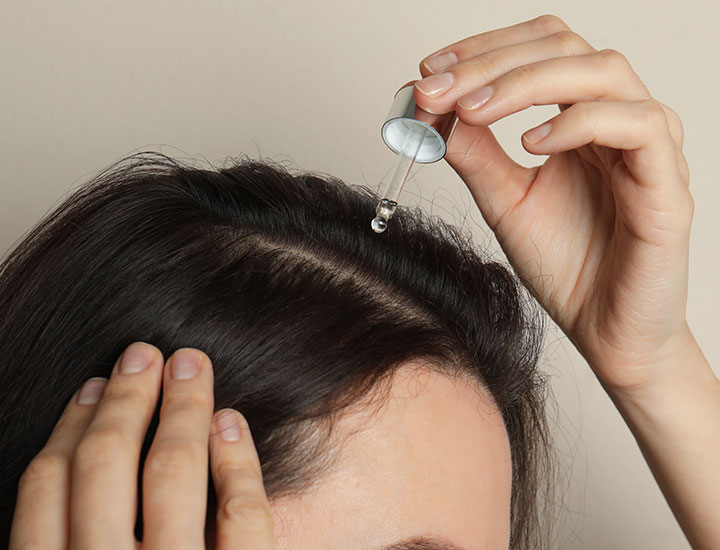Losing weight is a journey that comes with numerous health benefits like improved mood, better sleep, and reduced risks of heart disease. However, have you ever wondered about the potential impact on your hair? While shedding pounds can enhance your overall well-being, it’s essential to be aware of the potential side effects, such as hair loss.

Rapid weight loss, nutrient deficiencies, and hormonal changes can all play a role in hair loss. In this post, we’ll look into the reasons why weight loss might lead to hair loss, ways to prevent it, and possible solutions for regrowth.
Contents
- 1 Does Weight Loss Cause Hair Loss?
- 2 How to Prevent Hair Loss While Losing Weight?
- 2.1 1. Ensure Adequate Protein Intake:
- 2.2 2. Incorporate a Variety of Nutrients:
- 2.3 3. Stay Hydrated:
- 2.4 4. Aim for Gradual Weight Loss:
- 2.5 5. Avoid Restrictive Diets:
- 2.6 6. Consider Supplements:
- 2.7 7. Manage Stress:
- 2.8 8. Exercise Regularly:
- 2.9 9. Consult Healthcare Professionals:
- 2.10 10. Be Gentle with Your Hair:
- 3 Medications for Hair Regrowth:
- 4 Frequently Asked Questions:
Does Weight Loss Cause Hair Loss?
Yes, significant weight loss can sometimes lead to hair loss. This phenomenon is often due to a few key factors associated with rapid or substantial weight loss:
1. Nutritional Deficiencies:
Rapid weight loss or extreme dieting can lead to a lack of essential nutrients like proteins, vitamins, and minerals crucial for hair health. Deficiencies in iron, zinc, vitamin D, and certain B vitamins can contribute to hair loss.
2. Caloric Restriction:
Severe calorie restriction can stress the body, pushing it into survival mode. This diverts energy and nutrients away from non-essential functions like hair growth, leading to hair thinning or loss.

3. Telogen Effluvium:
This temporary form of hair loss can occur after significant stress to the body, such as rapid weight loss. It happens when more hairs than usual enter the resting phase of the hair growth cycle and then fall out.
4. Changes in Hormones:
Weight loss, especially if rapid, can lead to changes in hormone levels, influencing the hair growth cycle and potentially leading to hair loss.
5. Impact of Specific Diets:
Some diets, especially those that are very restrictive or unbalanced, can lead to a lack of sufficient nutrients for healthy hair growth.
How to Prevent Hair Loss While Losing Weight?
Preventing hair loss while losing weight involves a multifaceted approach focused on nutrition, gradual weight loss strategies, and overall health maintenance. Here are key strategies to help prevent hair loss during your weight loss journey:

1. Ensure Adequate Protein Intake:
Protein is essential for hair growth. Make sure your diet includes ample protein from varied sources like lean meats, fish, poultry, beans, and legumes.
2. Incorporate a Variety of Nutrients:
A balanced diet rich in vitamins and minerals supports hair health. Focus on foods high in:
- Iron (leafy greens, lean red meat, beans)
- Vitamin C (citrus fruits, strawberries, bell peppers) for iron absorption
- Omega-3 fatty acids (salmon, chia seeds, flaxseeds) for scalp health
- Vitamin E (nuts, seeds, avocado) for hair strength
- B Vitamins (whole grains, almonds, meat) including biotin
3. Stay Hydrated:
Adequate hydration is key to maintaining healthy hair. Drink plenty of water throughout the day.
4. Aim for Gradual Weight Loss:
Losing weight too quickly can shock your body and lead to hair loss. Aim for a sustainable weight loss of 1-2 pounds per week.
5. Avoid Restrictive Diets:
Diets that severely restrict calories or certain food groups can lead to nutrient deficiencies and hair loss. Choose a balanced, varied diet instead.
6. Consider Supplements:
If you’re not getting enough nutrients from your diet, consider supplements. Multivitamins, omega-3 fatty acids, and specific supplements like iron, vitamin D, or biotin can be beneficial, but consult with a healthcare provider first.
7. Manage Stress:
Stress can exacerbate hair loss. Incorporate stress-reduction techniques such as meditation, yoga, deep breathing, or hobbies into your routine.
8. Exercise Regularly:
Regular physical activity can improve overall health, including circulation to the scalp, potentially supporting hair growth. However, avoid over-exerting yourself, as extreme exercise can sometimes lead to increased hair shedding.
9. Consult Healthcare Professionals:
Before starting any weight loss or supplement regimen, it’s a good idea to consult with a healthcare provider or a dietitian. They can offer personalized advice based on your health status and nutritional needs.
10. Be Gentle with Your Hair:
Avoid hairstyles that pull on the hair (like tight ponytails or braids) and minimize heat styling and harsh chemical treatments that can weaken hair and lead to breakage.
Medications for Hair Regrowth:
Medications for hair regrowth have become increasingly effective in treating various forms of hair loss, including androgenetic alopecia (commonly known as male or female pattern baldness). Here are some of the most commonly prescribed and over-the-counter options:

1. Minoxidil (Rogaine):
- Usage: Applied topically to the scalp, Minoxidil is available over the counter and is used to treat both men and women.
- How it works: It widens blood vessels, improving blood flow to the hair follicles, which can stimulate hair growth and slow hair loss.
- Considerations: It needs to be used consistently for at least several months to see results, and hair loss may resume if the treatment is stopped.
2. Finasteride (Propecia):
- Usage: An oral prescription medication for men with hair loss.
- How it works: It inhibits the production of dihydrotestosterone (DHT), a hormone that shrinks hair follicles and is a key factor in male pattern hair loss.
- Considerations: It’s effective in slowing hair loss and promoting regrowth in many men, but it can have side effects, including sexual dysfunction. Women, especially those who are or may become pregnant, should not use it due to the risk of birth defects.
3. Dutasteride (Avodart):
- Usage: Though not FDA-approved for hair loss treatment, it’s sometimes used off-label for this purpose.
- How it works: Similar to finasteride, dutasteride inhibits the conversion of testosterone to DHT but is more potent and inhibits both types of the enzyme responsible for the conversion.
- Considerations: It may offer more significant results for hair regrowth than finasteride but carries similar risks of side effects.
4. Spironolactone (Aldactone):
- Usage: An oral medication often used off-label to treat female pattern hair loss.
- How it works: It’s a diuretic that also has anti-androgen effects, helping to reduce the production of DHT in women.
- Considerations: It’s not suitable for men due to its feminizing effects and is also not recommended during pregnancy.
5. Low-Level Laser Therapy (LLLT):
- Usage: Available in devices such as combs, caps, and headbands for home use.
- How it works: It uses laser light to stimulate cell growth and enhance blood circulation in the scalp, potentially improving hair density and thickness.
- Considerations: It’s considered safe and can be used in conjunction with other treatments, though results can vary.
6. Hair Transplant Surgery:
- Usage: While not a medication, it’s a more permanent solution for hair loss.
- How it works: Hair follicles are transplanted from areas of the scalp with active growth to balding or thinning areas.
- Considerations: It’s an invasive procedure that can be costly and requires recovery time, but it can provide very natural-looking results.
7. Platelet-Rich Plasma (PRP) Therapy:
- Usage: Another non-medication treatment growing in popularity for hair loss.
- How it works: A patient’s own plasma, enriched with platelets, is injected into the scalp to stimulate hair growth.
- Considerations: It requires multiple sessions and can be expensive, but it’s shown promising results for some individuals.
Frequently Asked Questions:
Are minoxidil and finasteride effective for hair regrowth?
Minoxidil stimulates hair follicles and is available over-the-counter. Finasteride inhibits the hormone DHT linked to male hair loss. Both are effective options for hair regrowth when used as directed.
What is saw palmetto and how does it help with hair loss?
Saw palmetto is a natural alternative believed to slow down hair loss. It works by blocking the conversion of testosterone to DHT, a hormone associated with hair loss.
Is it important to consult a healthcare provider before using hair regrowth medications?
Yes, it is crucial to consult a healthcare provider before starting any new hair regrowth regimen. They can provide guidance on the right medication, dosage, and potential side effects for your specific needs.

Hello, I’m Ravindra. Over the years, I’ve immersed myself deeply into the world of fitness and health, transforming both my body and mind. Writing has allowed me to share my journey, insights, and expertise with those just starting out and seasoned fitness enthusiasts alike. Beyond just routines and diets, I believe in inspiring others to adopt a holistic approach to well-being.
